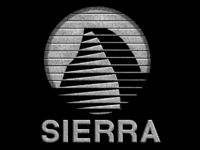Sierra On-Line, Inc.
Sierra On-Line was a famous developer of computer games, which was eventually absorbed and disbanded by its parent company (currently Activision).
History with the Ultima-Series[edit]
Sierra On-Line came into contact with the Ultima series in 1982, when Richard Garriott was looking for a publisher for Ultima II. Garriott intended to include a cloth map with every game, but as this was expensive, most publishers were not willing to pay for it. However, Garriott was able to talk Sierra into doing it.
After the game was published (some sources say even before, considering that Garriott seemed to lack enthusiasm later in the project), relations between Garriott and Sierra soured, since he didn't like how Sierra was attempting to gain more influence. The official reason was a dispute over the profit shares from the MS-DOS-port of the game. Garriott severed relations with Sierra, and with the money he had made with the Ultima games up to that point he founded Origin, in order to both develop and publish games on his own.
For years after they parted ways, Sierra was unwilling to sell the rights to Ultima II back to Garriott, though eventually they did. But even after that, Sierra still held the rights to the game's cover image until 1998 at the latest, preventing Origin from putting it in the many Ultima compilations it later released until the Ultima Collection, which finally had it. All later releases of Ultima II had the Sierra logo removed from the map, and all mentions of Sierra were replaced in the game by references to Origin.
Connections outside of Ultima II[edit]
As a side-note, the very crude VIC-20 game Ultima: Escape from Mt. Drash was published by Sierra in 1983 in the "Sierra Venture" series – this happened very shortly before Garriott severed relations with Sierra. Contrary to popular belief, Garriott was well aware of this release and consented to use of the Ultima brand. The game was not a great success and copies of it were actually buried in landfills by several retailers.
Sierra also re-published Ultima I as Ultima – The Original in a package very different from the original release. While the software itself was the same, box and manual were highly different from the release at California Pacific.
Trivia[edit]
- The name of the Quicksword, "Enilno", is "Online" written backwards, hinting at Sierra.
- Unlike other versions, the C64-port of Ultima II retained the Sierra references in the game itself.
- Sierra did change their logo in 1983, which is reflected on the Ultima II map. The original issue got the old logo in the lower right, while the second issue got the new logo (which Sierra would keep for 15 years). This change is also reflected on the back of the manual, with the "grey box" release sporting the new logo on the back of the manual, while all older manuals got the old logo.
Logo Gallery[edit]
External Links[edit]
- Sierra On-Line (Wikipedia)
| Companies involved with the Ultima series | |
|---|---|
| The Main Studio | Origin Systems Inc. |
| Western Companies | California Pacific Computer Co. ☥ Electronic Arts ☥ Looking Glass Studios ☥ MicroProse ☥ Mindscape ☥ Sierra On-Line, Inc. |
| Japanese Companies | Fujitsu Ltd. ☥ PonyCanyon Inc. ☥ StarCraft Inc. |


